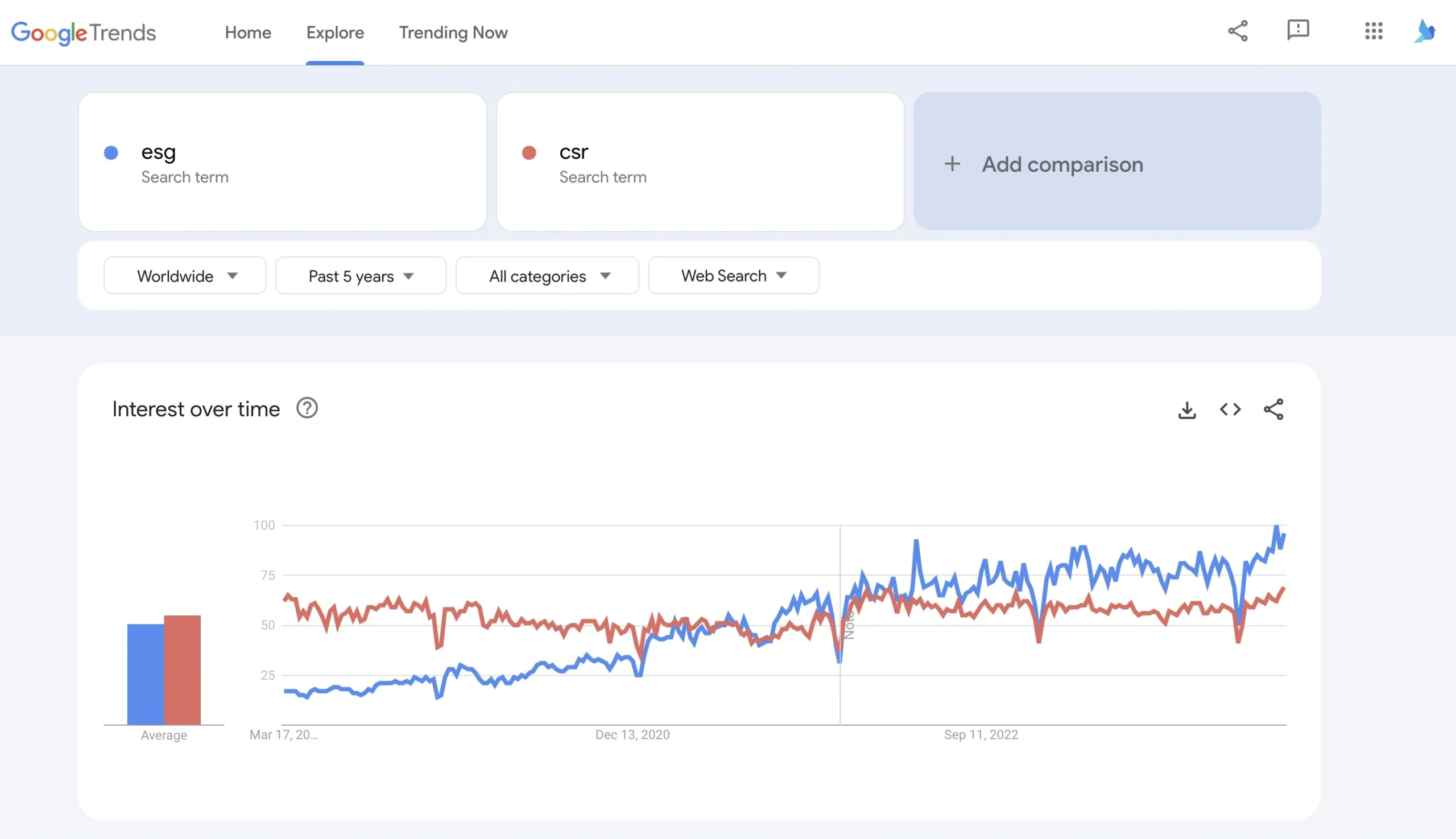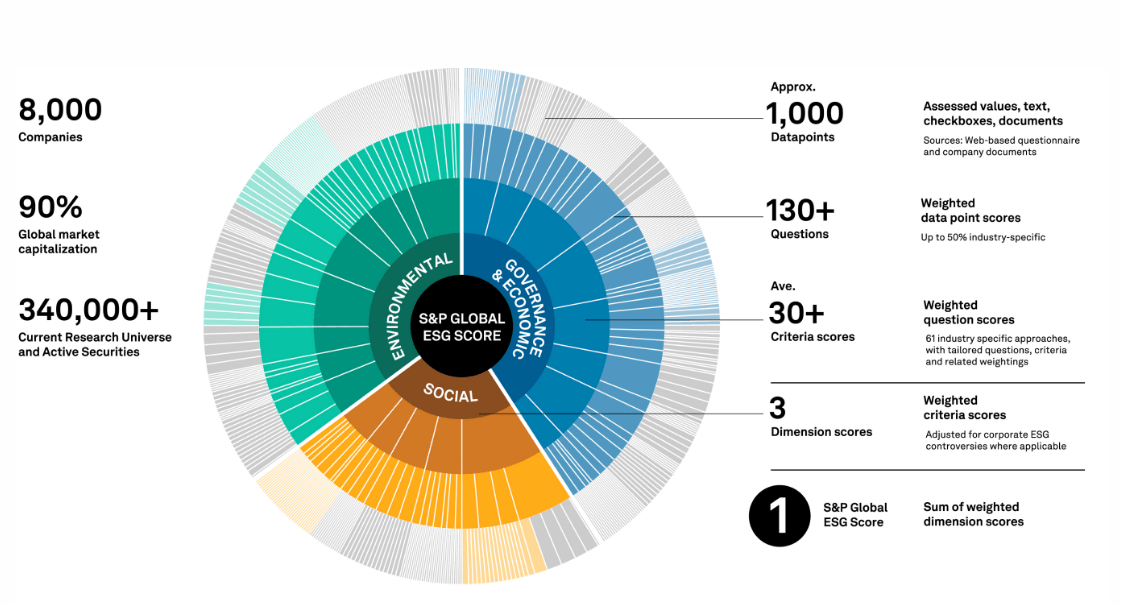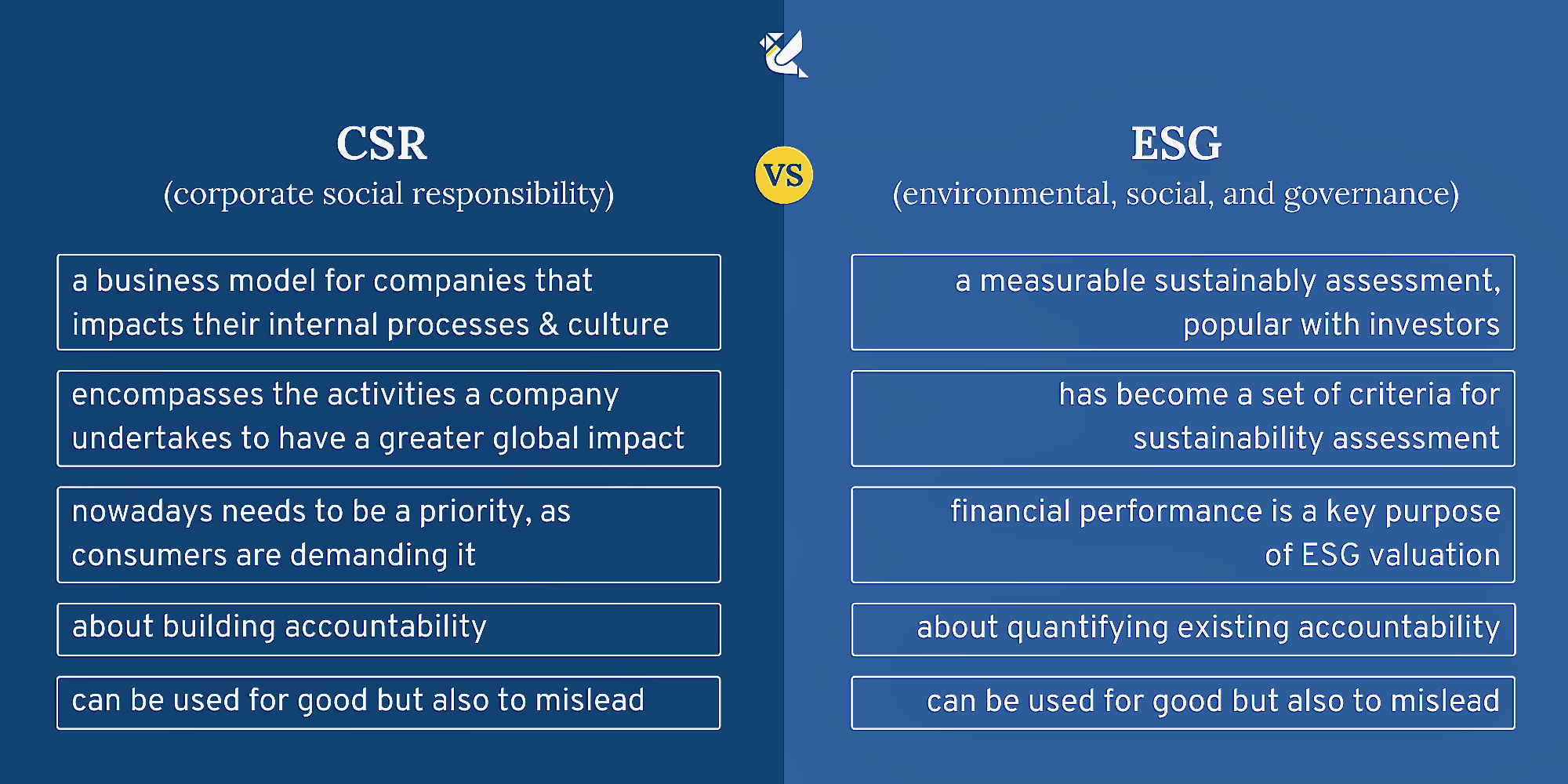The face of the business world is changing: sustainability is normalising, while buyers and investors expect to see companies transform.
In that light, many companies are taking strides to improve their communities and the world beyond. Sometimes these are serious, oftentimes more superficial. But these shifts have led to an increased focus on ESG (environmental, social, and governance) and CSR (corporate social responsibility) reporting.
You might be wondering is CSR the same as ESG? The abrupt answer is, no. Still, these terms are covered under the same sustainability umbrella. Let’s look at what the difference is between CSR and ESG, their usefulness and some noteworthy examples.
ESG vs CSR
In short, CSR is a company’s framework of sustainability plans and responsible cultural influence, whereas ESG is the assessable outcome concerning a company’s overall sustainability performance. In practical terms, you could also say:
- CSR: a general sustainability framework, mainly used by companies
- ESG: a measurable sustainability assessment, popular with investors
ESG is the most emergent of the two, having shot up in popularity over the past few years. Some people would even go so far as to say that ESG is replacing CSR.
But that hasn’t quite happened yet because they are still quite different things. Read on for a deeper dive into the factors involved.
What is CSR?
Corporate social responsibility (CSR) is no longer just admirable business practice. It’s a demand. People are more socially conscious than ever before. A recent study by Business Wire revealed that more than a third of buyers globally are prepared to pay more for sustainable products.
So, what is corporate social responsibility in detail?
CSR is the strategy companies develop to achieve positive widespread impact. But for many, it’s actually a business model that says, “We’re here, not just to make profit, but to address environmental and social concerns, too.”
And because of that holistic approach, CSR can influence a company’s reputation.
Nowadays people want to buy better products and it’s easy for them to voice their opinions of brands and businesses online. And so, prioritising corporate social responsibility is critical to success. But if social and environmental concerns won’t encourage companies to take action, loss of profit surely will.
Some examples of CSR in action:
- Lowering carbon footprint
- Buying fair trade products
- Investing in environmentally conscious businesses
- Participating in volunteer work
- Upgrading labour policies
- Engaging in charitable projects
Companies with a strong CSR approach
From bridging the “homework gap” to ambitious carbon-neutrality goals, these companies are aiming high in the CSR sphere:
Microsoft
This multinational technology operation is several gravity moonsteps ahead of most common corporate climate commitments. Similar to other companies, Microsoft claims to become carbon neutral by 2030. But what sets Microsoft apart is its promise to, by 2050, eliminate all the carbon it has ever produced since it was founded in 1975. It plans to achieve this by:
- Expanding internal carbon fee
- Assisting customers and suppliers to reduce their footprints
- Introducing an innovation fund on modern climate solutions
- Diverting 90% of landfill waste
- Producing fully recyclable Surface devices
At Akepa, we do find some of these lofty but distant pledges a touch questionable but it’d be great if they stick to their word.
View CSR Report
Disney
While Disney is mainly an entertainment company, they’ve identified a more noble purpose for themselves: committed to creating a better world. Some of the ways Disney creates positive impact is through the stories they share, experiences they offer, governance and philanthropy. In December 2022, they also announced plans to validate their goals with the Science-Based Targets initiative (SBTi) – as part of their net zero target by 2030.
View CSR Report
What is ESG?
ESG is the acronym for Environment, Social, and Governance. Combined, all three facets form a structure to evaluate a company’s long-term sustainability performance. Typically, ratings agencies like S&P round-up ESG performance as a score, based on data. In that way, it’s similar to CSR but 100% measurable.
Source: S&P
While social awareness plays a significant role, financial performance remains a key purpose of ESG valuation. The reason for this is simple: when a company’s ESG score goes up, its capital costs fall and its valuation improves. As a result, more investors pull up and larger pools of capital become available. In other words, ESG performance is becoming a sort of sustainability credit rating for companies and their investors.
Meanwhile, shareholders seek reflective and progressive policies in all three realms – not just one or two – and use it as a tool to weigh up a business’ overall sustainable performance.
It’s not surprising that ESG is a worthwhile investing strategy. According to Reuters, capital totalling US$649 billion flowed into ESG-linked funds in 2021. That’s a record amount that more than doubles the investment seen in 2019.
There are three main questions to address that will help companies evaluate their position within each area.
- What impact does your business and its policies have on the environment?
- What do your company’s relationships in its organisation look like?
- How does leadership run the company?
To gain some perspective, here are two brands with standout ESG reports.
Companies embracing ESG reporting
Oneview Healthcare (ASX: ONE)
OneView Healthcare is an interactive patient engagement system that enables patients and enhances healthcare experiences. With a vision to strengthen personalised care experiences, the team assists healthcare providers to empower patients and families, deliver virtual care and make patient flow more efficient.
View ESG Report
Verizon
At the start of the pandemic, this internet service provider factored in a plan to move the world forward for everyone. It specifically provided under-resourced schoolchildren with the necessary technology so they could participate in virtual learning. In doing so, Verizon Innovation Learning curbs the “digital divide” that left many disadvantaged children behind.
View ESG Report
A quick summary:
ESG & CSR Vs. Sustainability
Now for the big question.
How does ESG or CSR differ from ‘sustainability’?
It’s a good question and the way to think about it is remembering that ‘sustainability’ is an overall concept. ESG and CSR refer to measurable standards and a specific business model, respectively. ‘Sustainability’ is a slightly fluffy word, whereas ESG and CSR are clear-cut corporate terms that do, nevertheless, involve sustainability in their DNA.
Sustainability itself doesn’t really have a universal definition but we’ve gone some way to defining it in this other blog post on what sustainability means.
Looking ahead…
That wraps up the basic difference between CSR and ESG with some examples. While there are differences, the bottom line for both is that a global pandemic has strengthened rather than weakened sustainability awareness. Longer-term, it will be tricky to safeguard financial success and corporate reputation without total transparency and measurable action. Still, in a world where all eyes are on sustainability, ESG may just have the edge as the more quantifiable of the two frameworks.
And remember, although companies are shifting towards responsible activities that benefit more than their pockets, it doesn’t always indicate sincerity or success. Both CSR and ESG can be manipulated to mislead the public. Their usefulness in the age of sustainability is still up for debate. And ESG is under extra scrutiny because of its entanglement with investment.
This false brand perception is also known as “greenwashing”. Here’s another article from Akepa on the latest greenwashing cases. Have a read to see if you may have fallen victim to this sustainability subterfuge.
Are you keen to accelerate positive change with the help of a sustainable marketing agency? Get in touch with Akepa to learn how to develop a strategy that better informs customers in their sustainable choices.






This is an excellent description of the key similarities and differences between CSR and ESG. I’ve been working in the labor rights field on the compliance / regulatory/ development side for decades and am now shifting to ESG work within a global outdoor gear and apparel company. I hope to soon be pulling from the front, rather than pushing from the back!
Hi Nicholas. Thank you for the kind words. I’m glad the article resonated with you. You seem like someone who wants to lead by example and ditch the surface familiarity “do as I say” approach. We applaud this. All the best on your journey with the global outdoor gear company. Do let us know if you or your team need help developing a sustainable marketing strategy. Wishing you a wonderful holiday season.